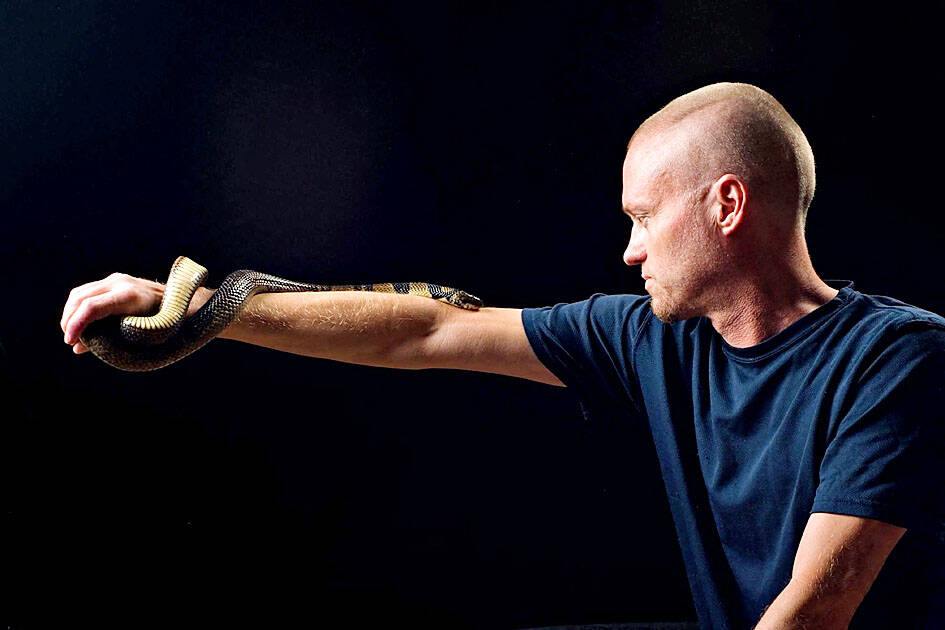Tim Friede was feeling particularly down on the day after the Sept. 11 attacks, so he went to his basement and let two of the world’s deadliest snakes bite him. Four days later, he woke up from a coma.
“I know what it feels like to die from snakebite,” Friede told AFP via video call from his home in the small US town of Two Rivers, Wisconsin.
This experience might put most people off snakes entirely, but Friede simply vowed to be more careful next time.

Photo: CENTIVAX / AFP
From 2000 to 2018, he allowed himself to be bitten by snakes more than 200 times. He also injected himself with their venom more than 650 times.
Friede endured this pain because he wanted to achieve total immunity to venom, a practice called mithridatism, which should not be tried at home.
After a couple of years, Friede started to believe he could be the basis for a better kind of antivenom. The former truck mechanic, who does not have a university degree, long struggled to be taken seriously by scientists, but last month, a study published in the prestigious Cell journal showed that antibodies from his blood protect against a range of snake venom.
The researchers now hope Friede’s hyper-immunity could even lead to the development of a universal antivenom.
This would fill a major need, as most antivenoms only cover one or a few of the world’s 600 venomous snakes.
Up to 138,000 people are killed by snakebites a year, while 400,000 suffer amputations or other disabilities, according to the WHO.
These figures are believed to be vastly underestimated because snakebite victims typically live in poorer, remote areas.
Friede’s first bite was from a harmless garter snake when he was five years old.
“I was afraid, I cried, I ran away,” said Friede, now 57.
Then he started bringing snakes home and hiding them in pickle jars. His mother sought counseling, but his interest in snakes persisted.
Things escalated after Friede attended a class that taught him how to “milk” snakes for their venom. How antivenom is made has changed little over the last 125 years: Small doses of snake venom are injected into animals such as horses, which produce antibodies that can be extracted and used as antivenom.
However this antivenom usually only works for bites from that particular species of snake — and it includes other antibodies from horse that can cause serious side-effects including anaphylactic shock.
“I thought, well, if they make antivenom in horses, why can’t I just use myself as a primate?” Friede said.
He started working through the venom from all the deadly species he could get his hands on, such as cobras, taipans, black mambas and rattlesnakes.
“There is pain every time,” he said.
For years, the scientists he contacted to take advantage of his immunity refused to bite.
Then in 2017, immunologist Jacob Glanville, who previously worked on universal vaccines, turned his attention towards antivenom. Glanville said he had been looking for “a clumsy snake researcher who’d been bit accidentally a couple times,” when he came across a video of Friede taking brutal back-to-back snake bites.
When they first spoke, Glanville said he told Friede: “I know this is awkward, but I would love to get my hands on some of your blood.”
“I’ve been waiting for this call for a long time,” came the response, Glanville said.
The antivenom described in Cell includes two antibodies from Friede’s blood, as well as a drug called varespladib.
It offered mice full protection against 13 of the 19 snake species tested, and partial protection for the remaining six.
The researchers hope a future cocktail will cover far more snakes — particularly vipers — with further trials planned on dogs in Australia.
Timothy Jackson of the Australian Venom Research Unit praised the immunological research, but questioned whether a human needed to be involved, pointing to synthetically developed antibodies.
Glanville said the ultimate goal of his US-based firm Centivax was to develop a universal antivenom administered by something like an EpiPen.
Friede said he was “proud” to have made a “small difference” in medical history.
Now working for Centivax, Friede stopped self-inflicting himself with venom in 2018 to save the firm from liability issues.
He hopes to get bitten by snakes again in the future.
“I do miss it,” he said.

‘HYANGDO’: A South Korean lawmaker said there was no credible evidence to support rumors that Kim Jong-un has a son with a disability or who is studying abroad South Korea’s spy agency yesterday said that North Korean leader Kim Jong-un’s daughter, Kim Ju-ae, who last week accompanied him on a high-profile visit to Beijing, is understood to be his recognized successor. The teenager drew global attention when she made her first official overseas trip with her father, as he met with Chinese President Xi Jinping (習近平) and Russian President Vladimir Putin. Analysts have long seen her as Kim’s likely successor, although some have suggested she has an older brother who is being secretly groomed as the next leader. The South Korean National Intelligence Service (NIS) “assesses that she [Kim Ju-ae]

In the week before his fatal shooting, right-wing US political activist Charlie Kirk cheered the boom of conservative young men in South Korea and warned about a “globalist menace” in Tokyo on his first speaking tour of Asia. Kirk, 31, who helped amplify US President Donald Trump’s agenda to young voters with often inflammatory rhetoric focused on issues such as gender and immigration, was shot in the neck on Wednesday at a speaking event at a Utah university. In Seoul on Friday last week, he spoke about how he “brought Trump to victory,” while addressing Build Up Korea 2025, a conservative conference

DEADLOCK: Putin has vowed to continue fighting unless Ukraine cedes more land, while talks have been paused with no immediate results expected, the Kremlin said Russia on Friday said that peace talks with Kyiv were on “pause” as Ukrainian President Volodymyr Zelenskiy warned that Russian President Vladimir Putin still wanted to capture the whole of Ukraine. Meanwhile, US President Donald Trump said that he was running out of patience with Putin, and the NATO alliance said it would bolster its eastern front after Russian drones were shot down in Polish airspace this week. The latest blow to faltering diplomacy came as Russia’s army staged major military drills with its key ally Belarus. Despite Trump forcing the warring sides to hold direct talks and hosting Putin in Alaska, there

North Korea has executed people for watching or distributing foreign television shows, including popular South Korean dramas, as part of an intensifying crackdown on personal freedoms, a UN human rights report said on Friday. Surveillance has grown more pervasive since 2014 with the help of new technologies, while punishments have become harsher — including the introduction of the death penalty for offences such as sharing foreign TV dramas, the report said. The curbs make North Korea the most restrictive country in the world, said the 14-page UN report, which was based on interviews with more than 300 witnesses and victims who had